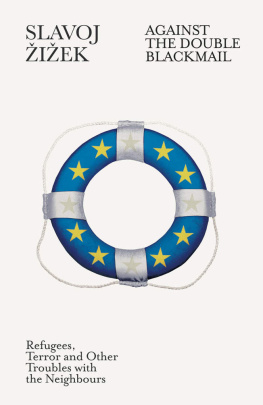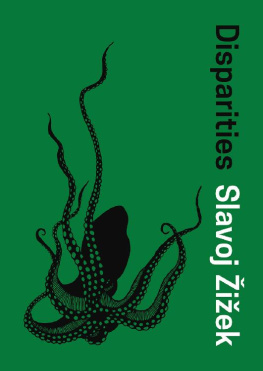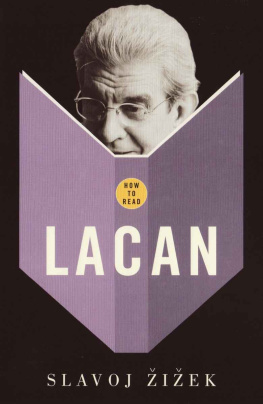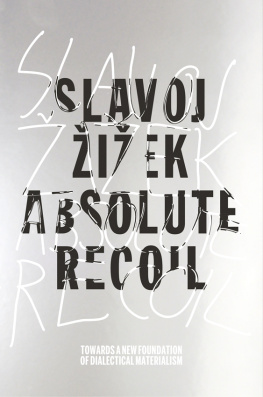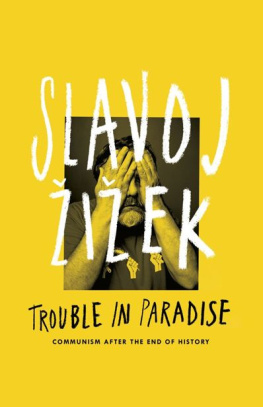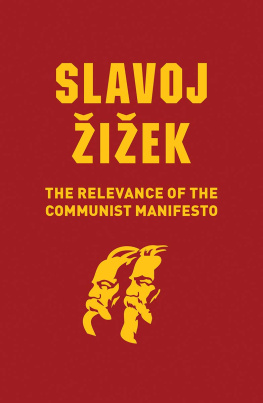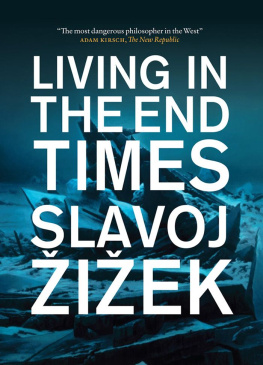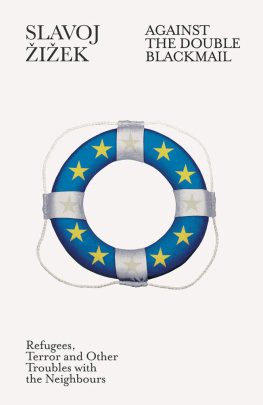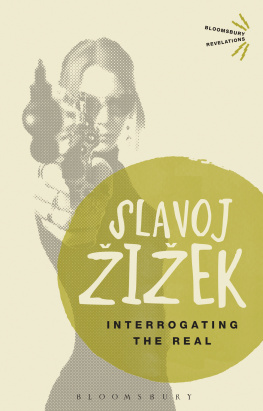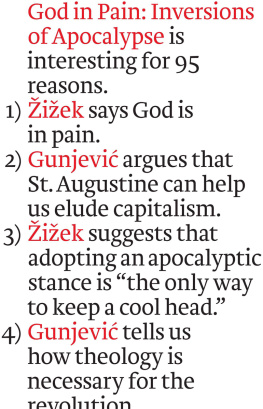Slavoj iek
AGAINST THE DOUBLE BLACKMAIL
Refugees, Terror and Other Troubles with the Neighbours
Contents
For Jela, till death (of our enemies, not ours)!
The Double Blackmail
In her classic study On Death and Dying, Elisabeth Kbler-Ross sets out her now-famous description of how we react to the news that we have a terminal illness. Our response evolves over five stages: denial (we simply refuse to accept the fact: This cant be happening, not to me); anger (which explodes when we can no longer deny the fact: How can this be happening to me?); bargaining (the hope we can somehow postpone or diminish the fact: Just let me live to see my children graduate); depression (libidinal disinvestment: Im going to die, so why bother with anything?); acceptance (I cant fight it; I may as well prepare for it). Kbler-Ross applied these stages to any form of catastrophic personal loss (joblessness, death of a loved one, divorce, drug addiction); she also emphasized that they do not necessarily come in the same order, nor are all five stages always experienced.
In Western Europe today, the reaction of both authorities and public opinion to the flow of refugees from Africa and the Middle East seems to comprise a similar combination of disparate reactions. There is less and less denial: Its not so serious, lets just ignore it. There is anger: Refugees are a threat to our way of life and besides, radical Islamists hide among them. They should be stopped at all costs! There is bargaining: OK, lets establish quotas and support refugee camps in their own countries! There is depression: We are lost, Europe is turning into Europastan! What is entirely lacking among these responses, though, is the last of Kbler-Rosss stages: acceptance, which, in this case, means a consistent Europe-wide plan of how to deal with the refugee issue.
The terrorist attacks across Paris in November 2015 complicated matters still further. Of course, the atrocities should be unconditionally condemned, but this but doesnt usher in any mitigating circumstances; there can be none but it is just that they need to be really condemned. What such a condemnation needs is more than what is usually portrayed in the media, the simple, pathetic spectacle of the solidarity of all of us (free, democratic, civilized people) against the murderous Islamic Monster. There is something weird about the solemn declarations that we are at war with the Islamic State: all the worlds superpowers against a religious gang controlling a small patch of mostly desert land This doesnt mean, of course, that we should not focus on destroying ISIS, unconditionally, with no but. The only but is that we should really focus on destroying it. In order to bring about this destruction, much more is needed than the pathetic declarations and appeals to the solidarity of all civilized forces against the demonized fundamentalist enemy. What we must avoid doing is engaging in the usual Left-liberal litany of One cannot fight terror with terror, violence only breeds more violence. Now is the time to start raising unpleasant questions: how is it possible for Islamic State to exist, to survive? We all know, in spite of the formal condemnation and rejection from all sides, there are forces and states that silently not only tolerate it, but help it.
As David Graeber pointed out recently, had Turkey placed the same kind of absolute blockade on ISIS territories as they have done on Kurdish-held parts of Syria, and shown the same sort of benign neglect towards the PKK and YPG that they have been offering to Islamic State, Islamic State would long since have collapsed, and the Paris attacks would probably not have happened. Similar things are going on elsewhere in the region: Saudi Arabia, the USs key ally, welcomes ISISs war on Shia Islam, and even Israel is suspiciously half-hearted in its condemnation of ISIS out of opportunistic calculation (ISIS is fighting the pro-Iranian Shia forces, which Israel considers its main enemy).
The deal on refugees between the EU and Turkey, announced at the end of November 2015 Turkey will curb the flow of refugees into Europe in exchange for generous financial help, initially of 3 billion Euro is a shamelessly disgusting act, a proper ethico-political catastrophe. Is this how the war on terror is to be conducted, by succumbing to the Turkish blackmail and rewarding one of the main culprits of the rise of ISIS in Syria? The opportunistic-pragmatic justification of this deal is clear (bribing Turkey is the most obvious way to limit the flow of refugees), but the long-term consequences will be catastrophic.
This obscure background makes it evident that the total war against ISIS should not be taken seriously the big warriors dont really mean it. We are definitely in the midst of the clash of civilizations (the Christian West versus radicalized Islam), but in fact there are clashes within each civilization: in the Christian space, it is the US and Western Europe against Russia; in the Muslim space it is Sunnis against Shias. The monstrosity of ISIS serves as a fetish covering all these struggles, in which every side pretends to fight ISIS in order to hit its true enemy.
The first thing we should note in a more serious analysis that reaches beyond the clichs of the war on terror is that the Paris attacks were a momentary brutal disruption of normal everyday life. (Significantly, of course, the attacks focused not on the Western military or political establishments, but on symbols of everyday popular culture restaurants, rock venues, football stadiums.) This form of terrorism a momentary disturbance tends to characterize attacks on developed Western countries, in clear contrast to many countries across the developing world, where violence is a permanent fact of life. Think about daily life in Congo, Afghanistan, Syria, Iraq, Lebanon where are the outpourings of international solidarity in the face of the constant atrocities perpetrated there? We should remember now that we live in a kind of glasshouse, in which terrorist violence for the most part exists in the public imagination as a threat, which explodes intermittently, in contrast to countries where usually with the participation or complicity of the West daily life consists of more or less uninterrupted terror and brutality.
What Sloterdijk correctly points out is that capitalist globalization stands not only for openness and conquest, but also for the idea of a self-enclosed globe separating its privileged Inside from its Outside. These two aspects of globalization are inseparable: capitalisms global reach is grounded in the way it introduces a radical class division across the entire globe, separating those protected by the sphere from those left vulnerable outside it.
In this way, both the Paris terrorist attacks and the now constant flow of refugees into Europe are momentary reminders of the violent world outside our glasshouse: a world which, for us insiders, appears mostly on TV and in media reports about distant conflicts, not as part of our everyday reality. Thats why it is our duty to become fully aware of the brutal violence that pervades the world outside our protected environment violence that is not only religious, ethnic and political but also sexual. In her outstanding analysis of the trial of South African athlete Oscar Pistorius, Jacqueline Rose pointed out how Pistoriuss killing of his girlfriend Reeva Steenkamp has to be read against both the complex background of white mens fear of black violence and the terrible reality of widespread violence against women: Every four minutes in South Africa a woman or a girl often a teenager, sometimes a child is reported raped and every eight hours a woman is killed by her partner. The phenomenon has a name in South Africa: intimate femicide, or, as the journalist and crime writer Margie Orford calls the repeated killing of women across the country, serial femicide.

